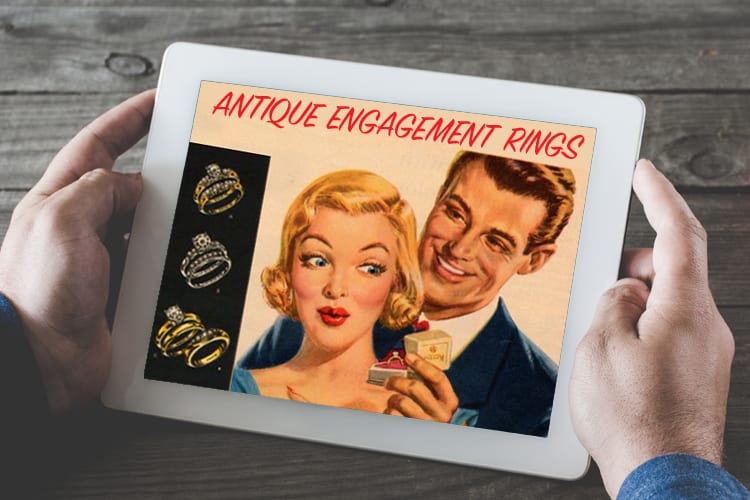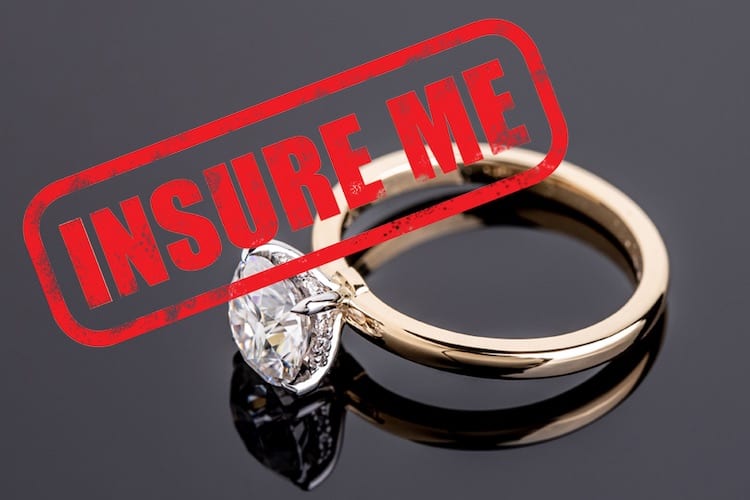
You’ve popped the question and the resulting Instagram story made it official: You’re getting married! It’s a joyous time in life, and yes, by joyous, we mean expensive.
Even if you’re planning a low-key ceremony to tie the knot, costs add up. Add to that a honeymoon, buying a house, and suddenly, you’re looking at a lot of future financial decisions.
With all those expenses, you may think investing in anything else at this time is absurd. But actually, a few key products and services can help save you time and money in the long run. Below are six investments you really should make before you walk down the aisles.
1) Jewelry Insurance
If you haven’t insured the engagement ring yet, do it ASAP. Is your ring covered under your renters or homeowner’s insurance? Consumers may be surprised by how little coverage they have under their standard homeowners or renters policy, notes Tyler Krowiorz, Brand Marketing Manager for Jewelers Mutual Insurance Group. “It’s important to be very clear what your homeowner’s policy does and does not cover. For example, while a policy may protect against theft, it may not protect against disappearance, which could happen if, say, she was gardening and misplaced the ring in the dirt.”
Other things to consider when buying a jewelry insurance policy:
1) The insurer will likely do their best to repair or replace the ring (rather than simply issue a payout for what the ring was worth), but you will likely be able to go to a jeweler of your choice, rather than select a jeweler from a list pre-approved by the insurer.
2) Filing a claim for the loss or theft of a ring on your homeowner’s or renter’s insurance could potentially cause your premium to rise.
So how much does jewelry insurance cost? It depends on the price of the piece, as well as your zip code, but a good rule of thumb is about 1 to 2% the cost of the ring (read more about ring insurance policy prices). Most customers choose a $0 deductible, but it may be possible to choose a plan with a deductible, which could lower the cost of premiums. While it’s common for the guy to buy the insurance around the purchase of the ring, it’s never too late to purchase jewelry insurance. This is an important conversation to have as it’s a huge investment being worn on one finger 24/7/365. Peace of mind can be quite inexpensive.
2) A high-yield savings account or investment account
Whether or not you’ve already pooled your finances, now’s the time to get real about financial goals in the future. One good option is a shared, high-yield savings account. These are often offered by online-only banks, which don’t have to cover the expense of brick-and-mortar branches. Typically, high-yield savings accounts offer an annual percentage rate (APR) of 2% or above, while a traditional savings account offers somewhere in the .5% to 1% range. Parking money in this sort of account can be good for short-term goals where you want your cash to be liquid, such as creating an emergency fund. For longer-term goals that you plan to hit in the next five or so years, you could consider opening an investment account. Of course, while an investment account has the potential for larger gains than a savings account, you also have the potential to lose your money. That’s why it may be a good idea to speak with a financial planner as a couple; they can help clue you in on short and long-term options for how best to grow your money.

3) A shared rewards credit card
Since you’re going to be spending a lot of cash in the near future (sorry, we’ll stop now), you might as well make the most of it. Now is a good time to sign up for a rewards credit card. Putting all wedding-related expenses on the card, including vendors, rentals, and those gift bags everyone said you had to make for overnight guests can help you reap a lot of rewards in a short period of time. These rewards can then be used to pay for flights and hotels on your honeymoon or potentially to provide cash-back to pay off your bill.
Something else to keep in mind: While it’s good to get in the habit of paying your credit-card balance in full each month, it’s understandable that you may run a balance from month to month as you plan your wedding. Looking for a card that has a 0% APR introductory offer can give you some wiggle room with your balance, as well as the option to pay your full balance off later with any money you may receive as wedding gifts. (see the best credit cards for wedding bills and the best credit cards for married couples for more info).
4) Life insurance
Even if your life doesn’t seem to be changing that much in the near future, there are likely big changes on the horizon. Whether it’s planning to buy a house, have kids, or explore Alaska’s Inner Passage in a canoe, now that you’re living together, make sure that each of you (and your kids) will be provided for in the event of death. While it may not be the most uplifting topic — most people prefer comparing wedding cakes than life insurance policies on a weekend — you will want to cross off finding individual life insurance policies from your to-do list. Another benefit of getting life insurance now: Rates tend to be lower when you’re young and healthy, and, if you’re buying a term policy, your rate is locked into place for the length of the term. That means if you’re thirty, you’ll be paying the same monthly rate for life insurance now that you would be in your fifties.

5) A financial planning session and some budgeting backup
Even if you’re not planning to merge your finances right away, it may be a good idea to get on the same financial page by working with a fee-based financial planner/advisor. Fee-based means that you only pay them for their time in a session (other planners work on commission-based investments.) If either of you have student loans, consumer debt, or want to discuss financial goals like buying a house or having children, a financial planner can look at your finances, offer suggestions, and give you both a road map. Working with a financial planner can also help you shift perspective from “me” to “we” and come up with some ideas for how to make sure you’re on track. For example, it may make sense to use a budgeting app like Mint or You Need a Budget that both of you can use in real time.
6) Health insurance
If you don’t already have health insurance, it’s a good idea to make sure you’re covered. Some studies suggest that almost 1 in 5 Americans don’t have health care. Now that you’re a unit, the last thing you want is for a doctor’s visit to bankrupt your savings and future financial plans. If one of you has health insurance, ask if the other can be on the same plan. Both of you insured? Compare plans and choose the best option for you (best value or most comprehensive coverage). Another thing to note: If you’re planning on having kids sooner rather than later, consider switching to a lower-deductible plan and compare plans to see what each offers in terms of fertility treatments and prenatal care. These appointments can add up fast, so preparing now may save you money later.
One last nugget of wisdom: It may be tempting to avoid these not-so-fun to-dos in favor of earmarking your cash for your wedding. But no matter how great your wedding is, it’s only one day/night. Bypassing the swan ice sculpture, the shot luge, or the oversize grilled shrimp in favor of say, a session with a financial planner or opening up an investment account may not be the most Instagrammable option, but it will help ensure your marriage starts on solid financial footing.



















